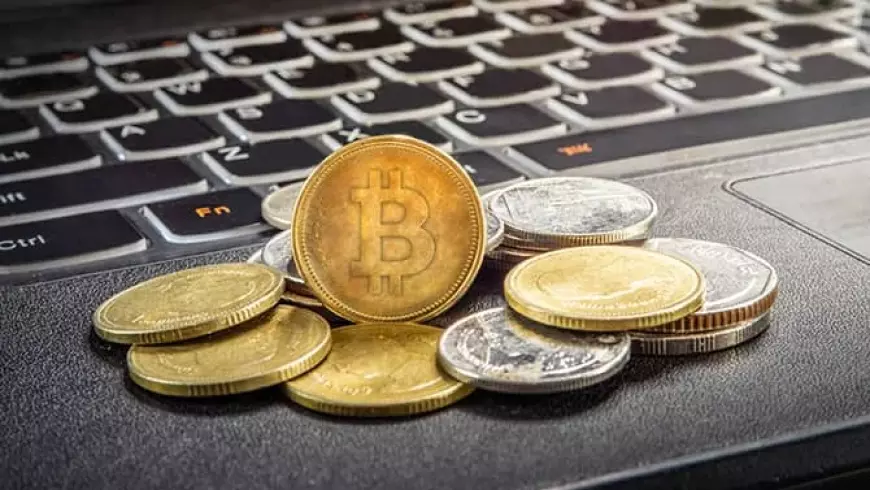What is bitcoin ? Explanation, essentials & utilization
Discover Bitcoin: a decentralized digital currency reshaping finance. Understand its benefits, risks, and potential for growth.

Bitcoin, introduced in 2009, represents the pioneering example of cryptocurrency, a decentralized form of digital currency that operates without the involvement of traditional intermediaries such as banks and governments. Bitcoin serves both as a means of exchange and as an investment vehicle.
Bitcoin (BTC) - Redefined: Understanding the Concept
Bitcoin is a digital currency designed to operate independently of central authorities like banks or governments. Utilizing blockchain technology, Bitcoin enables peer-to-peer transactions on a decentralized network. Transaction validation is facilitated through Bitcoin's proof-of-work consensus mechanism, rewarding cryptocurrency miners. Introduced in 2009 by the enigmatic developer Satoshi Nakamoto, Bitcoin (BTC) stands as the pioneering and most valuable asset in the realm of cryptocurrencies.
Earning with Bitcoin: Understanding Its Revenue Model
Bitcoin generates new coins through the mining process, where individuals, known as miners or nodes, employ high-speed computers to validate transactions. These transactions are then grouped into blocks, forming a continuous and public record known as the blockchain. Miners are rewarded with Bitcoin for their contribution, incentivizing the decentralized network to validate transactions independently. This process, called proof-of-work, reduces the risk of fraud by requiring majority consensus among miners before data is added to the blockchain.
What is the mechanism behind Bitcoin's operation?
Bitcoin functions as a digital asset, stored either in cryptocurrency exchanges or digital wallets, where each coin represents the current value of Bitcoin. Ownership can also extend to fractional shares, with the smallest unit named after Bitcoin's creator, Satoshi.
Blockchain
Bitcoin operates on blockchain technology, an open-source code creating a shared public ledger of transactions organized into blocks, linked to prevent manipulation. This ensures a permanent, universally accessible record of ownership.
Private and public keys
Bitcoin wallets contain both a public and private key, enabling users to initiate and digitally sign transactions securely, facilitating the transfer of ownership.
Bitcoin mining
Transaction verification on the Bitcoin network occurs through mining, confirming new transactions align with past ones. This prevents overspending or double-spending, ensuring transaction authenticity.
Choosing How to Store Your Bitcoins: Hot Wallets vs. Cold Wallets
When purchasing Bitcoin, you'll require a means of storage. Bitcoins can be stored in two types of digital wallets:
Hot wallet: Cryptocurrency can typically be stored on exchanges where it's bought or on standalone online storage platforms. These solutions offer access via computer browsers, desktop or smartphone apps.
Cold wallet: An encrypted portable device resembling a thumb drive, enabling you to download and transport your Bitcoins.
In essence, a hot wallet is internet-connected, whereas a cold wallet is not. However, a hot wallet is necessary to transfer Bitcoins into a portable cold wallet.
Determining Whether Bitcoin is a Wise Investment
Investing in cryptocurrency introduces you to a volatile asset category. A widely accepted guideline is to allocate only a small portion of a diversified portfolio to high-risk assets like Bitcoin or individual stocks.
The suitability of Bitcoin as an investment varies based on your unique situation, yet here are some advantages and disadvantages to contemplate.
Bitcoin Pros
Efficient and swift transactions: Bitcoin enables cost-effective transfers at high speeds, allowing for convenient transactions anytime and anywhere, potentially reducing time and expenses.
Privacy: Bitcoin transactions do not include personal details such as names or credit card numbers, enhancing privacy compared to traditional methods. Although linking a wallet to an individual remains possible, transactions generally offer greater privacy than credit card transactions.
Decentralization: Post-financial crisis, some investors seek an alternative decentralized currency, free from the influence of traditional banks or governing bodies.
Potential for growth: Investors who adopt a buy-and-hold strategy anticipate Bitcoin's increasing trust and widespread adoption, leading to potential value appreciation as the currency matures.
Bitcoin Cons
Price volatility: Bitcoin's value has experienced significant fluctuations over time, leading to varying outcomes for investors depending on when they entered the market. For instance, those who purchased Bitcoin during its rapid ascent to nearly $20,000 in 2017 had to wait until December 2020 to recoup their losses. Despite recent record highs, such as in March 2024, Bitcoin's price remains prone to volatility.
Security concerns: While proponents argue that blockchain technology underlying Bitcoin offers enhanced security compared to traditional electronic transfers, there have been notable instances of hacking. In May 2019, for example, over $40 million worth of Bitcoin was stolen from multiple high-net-worth accounts on the cryptocurrency exchange Binance, although the company reimbursed the losses.
Lack of SIPC protection: Unlike traditional brokerage accounts, investments in cryptocurrency are not covered by the Securities Investor Protection Corporation (SIPC), leaving investors without insurance protection in the event of theft or failure of a cryptocurrency exchange.












































